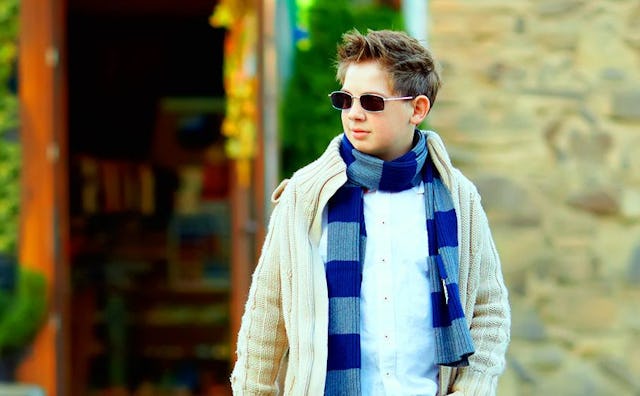7 Reasons Why I Don't Want My Son To Be The Cool Kid

My son starts kindergarten in a few weeks, a rite of passage that has given me a low level of anxiety all summer. The beginning of his school career means the beginning of potential social struggles—what if he has trouble making friends? What if he doesn’t find someone to sit with at lunch? My husband and I ranged from “shy” to “painfully shy” in our formative years, and I often wonder if these things are genetic. But research shows that children who are the “cool” kids often don’t turn out all that well: They struggle with addiction and bad behavior into adulthood. This was vastly reassuring to me—maybe being cool isn’t what we want for our kids, after all. Below, seven more reasons why I’m okay with my son not being cool.
1. Being cool is often about social dominance. In my experience, these kids were often really good at manipulating rather than befriending. They played people off one another; they accrued power by keeping other kids off balance. (Think Wendy in Blubber.) I want my boys to have a genuine interest in other people and to make friends on their own, sincere terms. Not as a power grab.
2. Successful people pursue their own interests, regardless of whether those interests are cool or not. Say you’ve got a kid who’s really, really into the life cycle of frogs, or obscure Elizabethan drama, or the macroeconomic policy of Latin America. These are probably not tickets to popularity for kids (or for adults, I can tell you, as someone who’s into obscure Elizabethan dramas. Eyes will glaze over when you bring up your current fascination with 16-century quadrilingual dictionaries). But I want my kids to have interests and pursuits beyond, say, vandalizing the roller rink and hanging out at the arcade. Or whatever the cool kids do nowadays.
3. Moral, ethical people listen to their own internal compasses. Not the crowd. If you’re consumed with your social status (who admires you, you who fears you) you’re going to take the group’s temperature before you listen to your gut. And raising kids, in this day and age, often means teaching them about the ethics of being a bystander in ugly situations. You want your kid to be the one intervening, or at least calling 911, when a party turns dangerous.
4. Grappling for social position doesn’t leave a lot of time for anything else. Kids need time and space to read, to play, to spend time with their families. Being hypervigilant about social status takes up time and mental bandwidth that I hope my kids will use for more satisfying pursuits. (Frankly, adults could use a lesson in this…as I once again check Facebook instead of practicing the guitar.)
5. Mastering a subject requires discipline and grit—which frequently means a lot of time alone. If one of my kids is into playing the piano, say, I want him to have the fortitude to actually sit down at the instrument for the hours per week it requires for mastery. Somehow I think the cool kids profiled in the Times article—the ones who were drinking and prematurely sexually active—weren’t exactly setting aside time for violin practice and chess club.
6. Kids who are egalitarian in their social lives are more respected. And happier, I’d say. I knew kids in high school who were “above the fray” of the social scene—they didn’t curry favor with popular kids and dis the unpopular ones. They were friendly to everyone and respected by everyone. This is what I’d hope for my boy.
7. They’re less likely to be derailed by older kids. According to the Times article linked above, the cool 13-year-olds were cool partly because they hung out with older teens (former cool kids themselves). Sixteen and 17-year-olds really shouldn’t be hanging with 13-year-olds. That’s just creepy.
All things considered, I’d be fine if my kids never attained “cool” status—and I’d be a little worried if they did. We want our kids to be happy, well-adjusted and true to themselves, no matter how they seem to others. You might even call it the anti-cool.
This article was originally published on